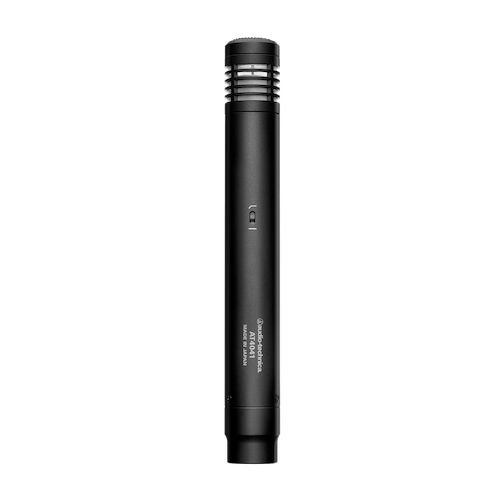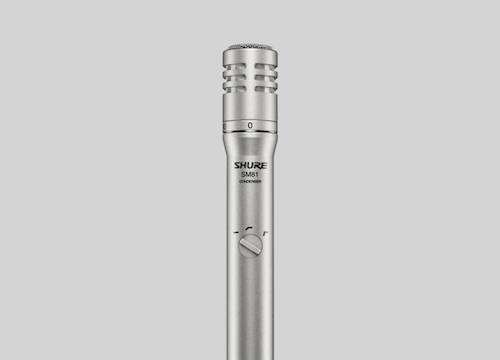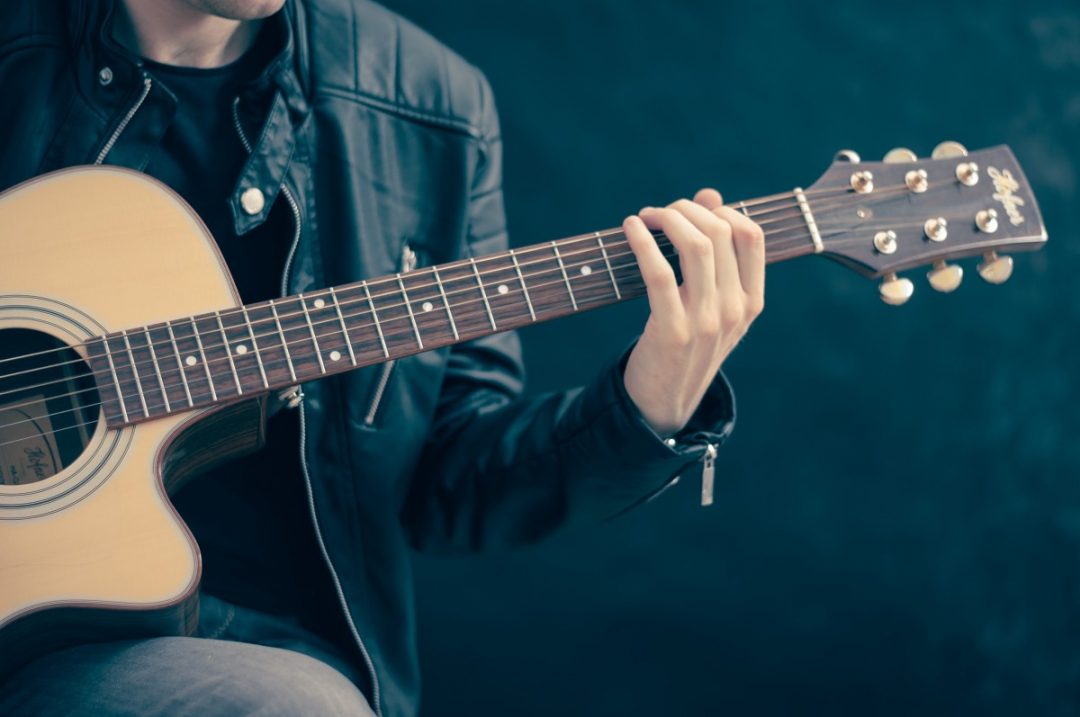Recording acoustic instruments can be a ton of fun. There’s intimacy in having an artist simply sit down with their acoustic guitar and play. Because there aren’t many moving parts from a technical perspective, you have more energy to focus on performance and nuance. That’s when the real challenge (and fun) begins! For those recording at home, finding the best mic for acoustic guitar can be daunting. Thankfully, you don’t need access to a high-end mic locker to capture excellent acoustic recordings!
What to Look for in an Acoustic Guitar Mic
That’s the age-old question that us gear junkies have, isn’t it? What is the best ‘x’ for accomplishing ‘y’? The real answer to this question is that there is no ‘best’ anything; sure, there are long-running favorites that engineers have relied on for years, but recording music is far too subjective an experience to claim a be-all-end-all. There are so many factors involved, from how the performer plays, the song itself, the instrument used, how the room sounds, the engineer and the artist’s personal sonic preferences, and on, and on.
With all of those other variables to consider, it almost makes mic choice seem trivial. In some ways it is, because talented engineers have been getting amazing results with little to nothing for decades. And in other ways it’s very important, based on tried-and-true acoustic guitar recording methods. Before we dive into our picks for the best mics, we’ll briefly discuss fundamental acoustic guitar recording techniques.
Recording Acoustic Guitar
Most engineers like to record acoustic guitar in high detail using some form of stereo miking. X/Y is easy enough to set up and makes use of cardioid mics, so you don’t have to worry about having multiple polar patterns on more expensive microphones. That’s one way to record acoustic guitar with richness and width.
Small diaphragm condensers are also a popular choice for acoustic guitar and other acoustic instruments because they tend to be very detailed in the way they capture sound. They also work beautifully as a pair for stereo recording, so SDCs are going to be at the top of the list for acoustic guitar.
Now here’s where things start to get ambiguous again, because certain dynamic mics, and of course large diaphragm condensers, are great for recording acoustic guitar as well. Dynamics are more genre-dependent, though; they’re insensitive and less detailed than a condenser, but would work great for someone doing heavy strumming. Of course, LDCs work on anything and everything. Usually one LDC placed anywhere between the bridge and the bottom of the neck to taste works well on acoustic guitar.
Best Mic for Acoustic Guitar Under $1000
1. Shure SM57
What can we say about the SM57 that hasn’t already been said? It’s easily in the top three (top two?) most famous microphones ever made. Since its debut, the 57 has likely played a part in just about every record ever made. Reputation aside, we don’t often consider this dynamic mic a great choice for quieter, more subtle acoustic instruments.
Even though the rugged and brash SM57 isn’t the best for recording the most detailed and nuanced performances, it’s still an awesome choice for someone who strums aggressively. The 57’s presence boost works well enough, and you can even use proximity effect to your advantage to give a thinner sounding guitar more body.
2. AKG C451

The ubiquitous 451 is one of the most famous small diaphragm condensers of all time. It’s primarily noted for being a fantastic hi-hat or cymbals mic, and strangely enough, what tends to work on parts of a drum set also tends to work on acoustic guitar. Even though the two instruments seem worlds apart in terms of sound, the fundamental goal of recording either is to capture transients and high-end sheen in great detail and clarity. Thus, the 451 makes for an excellent acoustic guitar mic, whether alone or (better yet) as a stereo pair.
3. Audio-Technica AT4041

Here’s another straightforward SDC with a reputation for sounding great and being very affordable. This one has a smooth frequency response across most of the spectrum until it reaches a modest boost in the highs for some added presence and air. Depending on your taste, that extra little bit of kick in the top end could sound phenomenal when capturing all the details and nuance of an acoustic guitar.
- RELATED: Akai Professional MPC One Review
4. Avantone Pro CK-1
![]()
The CK-1 by Avantone Pro is a small diaphragm FET condenser perfect for recording acoustic guitar at well under $1000. They’re so affordable, in fact, that it would be a good idea to pick up a pair of these bad boys so you can utilize stereo miking techniques on your acoustic. They feature a high-pass filter and a pad, so they’re also useful on other sources apart from guitar. Great mics for such a great price.
5. AKG C214

The 214 shares DNA with the iconic 414 in a more affordable package. If you know anything about 414s, you’d know that they’re one of the most favored and versatile LDCs apart from the venerable Neumann U87. The 214 is definitely on par in terms of sound quality, though it lacks some of the extra features found in its big brother. Thankfully that’s no compromise when recording acoustic guitar, making the 214 one of the top choices in large diaphragm condenser microphones.
- RELATED: Neumann TLM 102 vs Neumann TLM 103
6. Universal Audio SP-1 Pencil Microphone Pair

The Universal Audio SP-1 Pencil Microphone Pair delivers exceptional clarity and detail, ideal for recording acoustic instruments. These small-diaphragm condensers capture transient responses accurately, providing a natural, transparent sound. Key features include a cardioid polar pattern, high SPL handling, and low self-noise, ensuring versatile application in various recording environments. The matched pair offers consistent stereo imaging, making it perfect for capturing intricate acoustic performances. With a robust build and a frequency response tailored for acoustic guitars, the SP-1 excels in both studio and live settings.
Best Mic for Acoustic Guitar Over $1000
1. AKG C414 XLS
![The 10 Best Mics for Acoustic Guitar in 2023 [Any Budget]](https://producelikeapro.com/blog/wp-content/uploads/2023/02/C414XLS-large.jpg)
When we think of legendary microphones, a good handful certainly come to mind. The AKG C414 is part of that group, as one of the most versatile and practical LDCs ever made. The XLS version offers nine polar patterns, a three-step high-pass filter, and three-step pad. Its ability to capture acoustic and stringed instruments in lifelike detail makes it an excellent choice.
2. Lauten Audio Clarion FC-357
![The 10 Best Mics for Acoustic Guitar in 2023 [Any Budget]_2](https://producelikeapro.com/blog/wp-content/uploads/2023/02/Clarion-large.jpg)
Lauten Audio consistently impresses with their lineup of vintage-inspired, modern microphones. The FC-357 is no exception — a large-diaphragm FET condenser combining the best of classic and modern sound in a single microphone. It excels at not only instrument miking, but vocals, overheads, and more. The sound is natural and round like you’d find in a vintage FET, with a hint of contemporary hi-fi to place it in time.
3. Neumann KM 184 Stereo Pair
![The 10 Best Mics for Acoustic Guitar in 2023 [Any Budget]_3](https://producelikeapro.com/blog/wp-content/uploads/2023/02/KM184Pair-large.jpg)
Neumann’s KM 184 boasts a wide range of applications, including everything from loud and brash sources like cymbals, percussion, and brass, to the more intimate detail of sparkling acoustic guitar and piano. As a stereo pair, you can employ stereo miking techniques to record acoustic guitar with more width and depth, as if you’re in the room with the guitarist. These mics have a very lifelike quality to them that sounds fantastic on acoustic guitar.
4. Beyerdynamic MC 930 Stereo Pair

Often overshadowed by the competition, these awesome little SDCs by Beyerdynamic sound great and come in matched stereo pairs. They come with high-pass filters, pads, windscreens, and a nice carrying case to boot. The MC 930 is perfect for solo instruments like the acoustic guitar.
5. Neumann U 87

Surely we all saw this coming, right? The U 87 is the most famous FET condenser microphone of all time, and certainly one of the most recorded mics in history. Its versatility is responsible for that, and you can rest assured it would sound right at home on the acoustic guitar. We did say any budget!
- RELATED: What Is a True Peak Limiter?
6. Royer R-121 Studio Ribbon Microphone

The Royer R-121 Studio Ribbon Microphone offers a warm, natural sound with exceptional depth, ideal for recording acoustic guitars. Its figure-8 polar pattern captures room ambiance and instrument details with remarkable accuracy. The R-121’s ribbon element delivers a smooth frequency response, with a rich low-end and silky high-end.
It handles high SPLs, making it versatile for various recording applications. Its robust build ensures longevity, while its vintage character adds a unique sonic quality. The R-121 is a top choice for professional studios seeking a high-quality ribbon microphone.
Best Budget Acoustic Guitar Mics
There are plenty of options under $1000. Many can even be purchased in pairs for less than a grand. These are a handful of the top picks for the home recorder!
1. Shure SM81

The Shure SM81 small diaphragm condenser is designed for acoustic guitarists first and foremost. Shure kindly opens the door for use on piano and drum overheads or hi-hats too, but this thing really gets it done on guitar. It’s pretty simple in terms of features; it’s a fixed cardioid mic with low self-noise, high SPL tolerance, and a switchable high-pass filter. From there, it’s just point and shoot!
2. Lewitt LCT 040 Stereo Pair

These little microphones are just awesome. The price is exceptional, they’re super lightweight, and the sound is balanced, natural, and detailed — you couldn’t really ask for more in a budget pair of SDCs. They’re specifically engineered to be great on acoustic guitar, drums, and other stringed/acoustic instruments. Easily near the top of the best mic for acoustic guitar argument on a budget. Chef’s kiss.
3. Lewitt LCT 240 Pro

The Lewitt LCT 240 Pro is an unbelievable utility mic for entry-level recording. Lewitt themselves note that it ‘excels on acoustic guitar,’ but works great on a variety of different sources. It’s one of the most affordable Swiss Army LDCs you can add to your home studio collection. Like some of the other mics in this selection, it boasts a reasonably flat frequency response until about 3k where it begins to climb, centering on a large 8k boost. This extra presence and top-end glimmer is great for flattering a shimmery acoustic guitar performance.
4. Lauten LA-220

This guy is an impressive LDC almost tailor made for acoustic guitar. With features exceeding its price, the LA-220 comes with switchable high-pass and low-pass filters at 120 Hz and 12 kHz respectively. Recording acoustic guitar means you may contend with low-end boominess and high-end harshness, which these filters take head-on. The overall design is inspired by vintage classics, with more modern noise-free components and a price tag that anyone can afford.
5. Røde NT1

Not to be confused with the ridiculously popular NT-1A, the NT1 is a similarly versatile budget LDC, with a slightly less hyped top-end. As a true studio workhorse, one of these could be your all-around microphone for solo recordings, including acoustic guitar and vocals. The kit is well priced and the mic sounds hi-fi.
6. AKG P170 Small Diaphragm Condenser Microphone

The AKG P170 Small Diaphragm Condenser Microphone is a budget-friendly option for recording acoustic guitars with precision. Its cardioid pattern reduces background noise, focusing on the instrument’s sound. The P170 features a 1/2-inch diaphragm, providing clear and detailed recordings with a balanced frequency response.
It handles high SPLs well, making it suitable for dynamic playing styles. Its rugged construction ensures durability, while its lightweight design allows easy positioning. The P170 is ideal for home studios and professional setups alike.
Conclusion
The best mic for acoustic guitar isn’t just one! There’s a whole massive world of microphones out there, and we’ve chosen but a few to share based on what tends to work when recording acoustic instruments. Most of the time small diaphragm condensers sound great, especially in stereo pairs. Large diaphragm condensers make a perfect single-mic choice, though they can be used for stereo recording as well.




